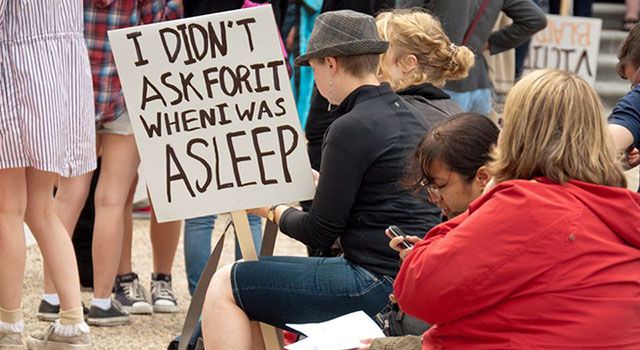The law SB 967, nicknamed “Yes Means Yes” makes it absolutely necessary for both partners to verbally consent before and during all sexual activity. This law also states that the choice of saying “yes” can be revoked at any time.

This law creates less confusion and misinterpretation between both parties involved in the sexual act.
The law states: “Affirmative consent” means affirmative, conscious, and voluntary agreement to engage in sexual activity. It is the responsibility of each person involved in the sexual activity to ensure that he or she has the affirmative consent of the other or others to engage in the sexual activity. Lack of protest or resistance does not mean consent, nor does silence mean consent. Affirmative consent must be ongoing throughout a sexual activity and can be revoked at any time. The existence of a dating relationship between the persons involved, or the fact of past sexual relations between them, should never by itself be assumed to be an indicator of consent.
“Now that it’s passed, all schools that get state money for financial aid have to use what is known as an ‘affirmative consent standard’ to decide whether a sexual assault took place,” according to Vox. “That means that if both people didn’t make it absolutely clear that they consented to their sexual encounter, the college can find that the person who didn’t consent was assaulted.”
This type of consent, which the law makes clear, cannot be given by someone who is asleep or incapacitated in any way, including by drugs and alcohol.
This law will allow the school to rule that the victim was sexually assaulted with this type of consent and the law clearly states that “drunkenness isn’t an excuse for being confused about whether you received affirmative consent from your sexual partner.” In other words, when either partner is under the influence of drugs or alcohol, they are not in any state of mind to be making decisions that could potentially affect them physically, mentally or emotionally.
This does not mean that only women are required to give consent. Men must also agree to all sexual activity, which is an important aspect of the law. This shows that the law is not only focused on stopping the continuous rapes inflicted on women but for assaults that occur to men as well.
The problem is that there is an inequality in relationships. With the “Yes Means Yes” law, there will be equal relationships.
People misunderstand the “Yes Means Yes” law and focus on the mechanics of saying “yes” while engaged in sex. However, what “Yes Means Yes” is all about is making sure a relationship is between two equal consenting partners, not “Did you just say yes or maybe and can I move onto the next stage of our sexual encounter?”
The problem is, there will always be a he-said-she-said issue in regards to who is the victim in the situation and what the truth of the matter is.
“The Department of Justice found that one in five women is the victim of an attempted or completed sexual assault while in college,” according to Vox.
As students on campus, rape never seems like a possibility when you are around people who have similar hopes and dreams as you, but that is not the case. According to the 2014 Annual Fire and Security Safety Report, at Cabrini in the past year alone, there have been two sexual offenses and that is not counting all the rapes that go unreported. Students want to come to college, knowing that yes, there will be sex, but as individuals, they have the right by law to say “yes” and “no” before any sexual activity happens and that these rights can and should be stated to revoke their previous statements at any given time.
While rape remains an ongoing issue, the prayers and hopes for the creation of the law is that there will now be more clarification for the sexual partners and that those who have been assaulted find peace in knowing there are laws in place to help stop this injustice.



